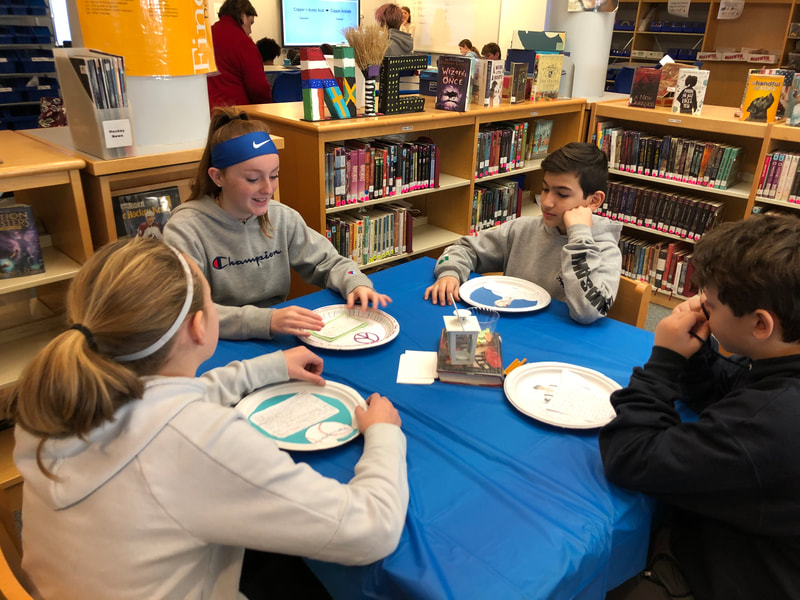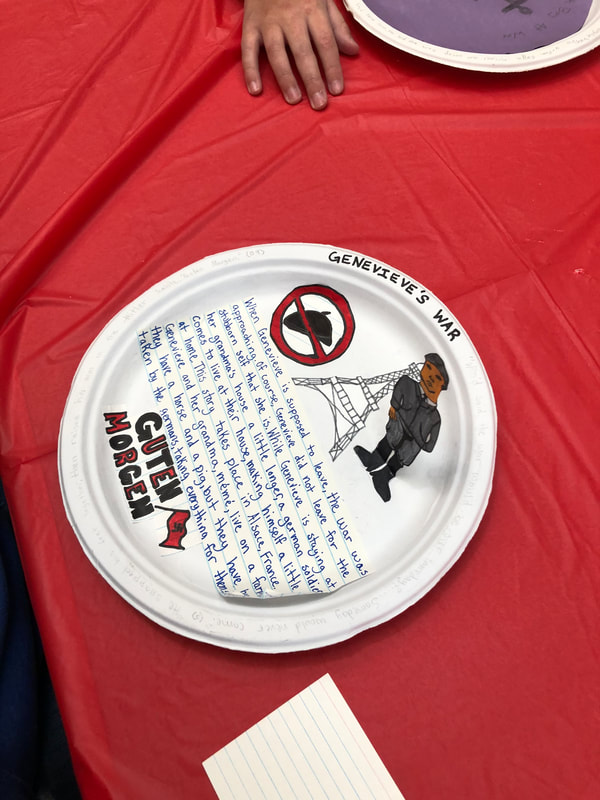I consider myself fortunate in that all 300 of our 6th grade students visit the library each month with their ELA teachers, with whom I collaborate to plan those visits. The YA librarian and head of youth services at our public library collaborates with us on a regular basis as well. We prepare book talks, show book trailers, create speed-dating events and poetry extravaganza days. Aside from those endeavors, though, I wanted to support our ELA teachers more deeply and explicitly as they took on their latest challenge, that of implementing reading and writing workshops. To that end, we (ELA teachers and the YA librarian and I) planned a more extensive collaboration involving book blurbs, book selection, reading, writing, and connections to future units. We are just finishing up that collaborative project.
We chose the 6th grade historical fiction reading and writing unit. Here’s what we knew:
- We wanted multiple copies of enough titles for students to have a wide range of choices, and for students to meet the requirement that they read and do the accompanying work with at least one, and up to four, other students.
- We didn’t have a lot of lead time, so we needed to offer many older titles, copies of which we had boxed in the school basement. We supplemented with a limited number of titles ordered by our curriculum director. Finally, we borrowed titles from our public library. The YA librarian, Michelle Deschene, had already purchased a couple hundred books in the genre for previous book talking classes.
After three or four weeks of reading and writing exercises, students returned to the library, where we supervised “dinner table talks,” described in the blog Three Teachers Talk (Eck). We had set the tables with tablecloths and centerpieces that included a historical fiction book they could choose to check out. Students arrived having created paper plate props with the title and author of their book, a descriptive word that summarizes the theme of their book, an interesting passage, a summary, some type of artwork, and a rating of one to five stars indicating how much they liked the book. We instructed them to sit at any table that didn’t already have someone who had read the same book they had read. Students listened to each other’s book talks, using their plates as props to help them talk about their books. We provided index cards on the “dining tables” for students to note the title of a book they heard about and wanted to check out. As Eck explains in the article:
These first book talks are unpolished and imperfect, but they get the conversations going in a low-risk environment of sitting around the dinner table with their friends. This space becomes a place where they can share the books they have read without the anxiety of talking in front of the whole class.
I explained in the introduction to the walkabout that the three genres represented on the tables all complemented classroom work. Specifically, they had just finished their historical fiction work and could have chosen another book in that genre, perhaps one that a classmate had recommended during the dinner table book talks; they had just begun nonfiction skills work in ELA class and could have chosen a nonfiction book; and finally, if they chose a biography, it could be of use to them in the upcoming StoryCorps project that will involve interviewing someone about their life.
As we plan for next year, we will use the data in the form of one to five star ratings on the paper plates to cull our long list of historical fiction title choices. Instead of offering multiple copies of 100+ titles, many of which no students selected, I would like to trim the list considerably. We may even select as few as 15 titles, five per team, and request that our curriculum director purchase multiple copies of only those titles. That way, librarians and ELA teachers will be able to familiarize themselves with all the titles and assign more in-depth work for the unit. Students had time for only minimal research around the time period and/or event presented in their books, and there were too many different titles for us to provide pathfinders for them to do additional research in the short planning time before the project began. Fewer titles, and more planning time of course, would help address that issue as well.
Works Cited
Eck, Leigh Anne. “Dinner Table Book Talks.” Three Teachers Talk, 5 Dec. 2019, threeteacherstalk.com/2019/12/05/dinner-table-book-talks/. Accessed 10 Feb. 2020.



